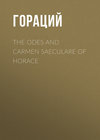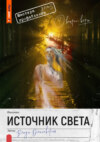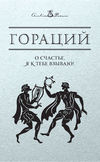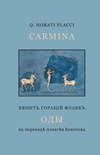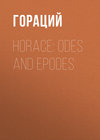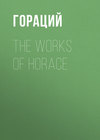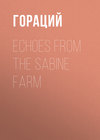Читать книгу: «The Odes and Carmen Saeculare of Horace»
PREFACE
I scarcely know what excuse I can offer for making public this attempt to "translate the untranslatable." No one can be more convinced than I am that a really successful translator must be himself an original poet; and where the author translated happens to be one whose special characteristic is incommunicable grace of expression, the demand on the translator's powers would seem to be indefinitely increased. Yet the time appears to be gone by when men of great original gifts could find satisfaction in reproducing the thoughts and words of others; and the work, if done at all, must now be done by writers of inferior pretension. Among these, however, there are still degrees; and the experience which I have gained since I first adventured as a poetical translator has made me doubt whether I may not be ill-advised in resuming the experiment under any circumstances. Still, an experiment of this kind may have an advantage of its own, even when it is unsuccessful; it may serve as a piece of embodied criticism, showing what the experimenter conceived to be the conditions of success, and may thus, to borrow Horace's own metaphor of the whetstone, impart to others a quality which it is itself without. Perhaps I may be allowed, for a few moments, to combine precept with example, and imitate my distinguished friend and colleague, Professor Arnold, in offering some counsels to the future translator of Horace's Odes, referring, at the same time, by way of illustration, to my own attempt.
The first thing at which, as it seems to me, a Horatian translator ought to aim, is some kind of metrical conformity to his original. Without this we are in danger of losing not only the metrical, but the general effect of the Latin; we express ourselves in a different compass, and the character of the expression is altered accordingly. For instance, one of Horace's leading features is his occasional sententiousness. It is this, perhaps more than anything else, that has made him a storehouse of quotations. He condenses a general truth in a few words, and thus makes his wisdom portable. "Non, si male nunc, et olim sic erit;" "Nihil est ab omni parte beatum;" "Omnes eodem cogimur,"—these and similar expressions remain in the memory when other features of Horace's style, equally characteristic, but less obvious, are forgotten. It is almost impossible for a translator to do justice to this sententious brevity unless the stanza in which he writes is in some sort analogous to the metre of Horace. If he chooses a longer and more diffuse measure, he will be apt to spoil the proverb by expansion; not to mention that much will often depend on the very position of the sentence in the stanza. Perhaps, in order to preserve these external peculiarities, it may be necessary to recast the expression, to substitute, in fact, one form of proverb for another; but this is far preferable to retaining the words in a diluted form, and so losing what gives them their character, I cannot doubt, then, that it is necessary in translating an Ode of Horace to choose some analogous metre; as little can I doubt that a translator of the Odes should appropriate to each Ode some particular metre as its own. It may be true that Horace himself does not invariably suit his metre to his subject; the solemn Alcaic is used for a poem in dispraise of serious thought and praise of wine; the Asclepiad stanza in which Quintilius is lamented is employed to describe the loves of Maecenas and Licymnia. But though this consideration may influence us in our choice of an English metre, it is no reason for not adhering to the one which we may have chosen. If we translate an Alcaic and a Sapphic Ode into the same English measure, because the feeling in both appears to be the same, we are sure to sacrifice some important characteristic of the original in the case of one or the other, perhaps of both. It is better to try to make an English metre more flexible than to use two different English metres to represent two different aspects of one measure in Latin. I am sorry to say that I have myself deviated from this rule occasionally, under circumstances which I shall soon have to explain; but though I may perhaps succeed in showing that my offences have not been serious, I believe the rule itself to be one of universal application, always honoured in the observance, if not always equally dishonoured in the breach.
The question, what metres should be selected, is of course one of very great difficulty. I can only explain what my own practice has been, with some of the reasons which have influenced me in particular cases. Perhaps we may take Milton's celebrated translation of the Ode to Pyrrha as a starting point. There can be no doubt that to an English reader the metre chosen does give much of the effect of the original; yet the resemblance depends rather on the length of the respective lines than on any similarity in the cadences. But it is evident that he chose the iambic movement as the ordinary movement of English poetry; and it is evident, I think, that in translating Horace we shall be right in doing the same, as a general rule. Anapaestic and other rhythms may be beautiful and appropriate in themselves, but they cannot be manipulated so easily; the stanzas with which they are associated bear no resemblance, as stanzas, to the stanzas of Horace's Odes. I have then followed Milton in appropriating the measure in question to the Latin metre, technically called the fourth Asclepiad, at the same time that I have substituted rhyme for blank verse, believing rhyme to be an inferior artist's only chance of giving pleasure. There still remains a question about the distribution of the rhymes, which here, as in most other cases, I have chosen to make alternate. Successive rhymes have their advantages, but they do not give the effect of interlinking, which is so natural in a stanza; the quatrain is reduced to two couplets, and its unity is gone. From the fourth to the third Asclepiad the step is easy. Taking an English iambic line of ten syllables to represent the longer lines of the Latin, an English iambic line of six syllables to represent the shorter, we see that the metre of Horace's "Scriberis Vario" finds its representative in the metre of Mr. Tennyson's "Dream of Fair Women." My experience would lead me to believe the English metre to be quite capable, in really skilful hands, of preserving the effect of the Latin, though, as I have said above, the Latin measure is employed by Horace both for a threnody and for a love-song.
The Sapphic and the Alcaic involve more difficult questions. Here, however, as in the Asclepiad, I believe we must be guided, to some extent, by external similarity. We must choose the iambic movement as being most congenial to English; we must avoid the ten-syllable iambic as already appropriated to the longer Asclepiad line. This leads me to conclude that the staple of each stanza should be the eight-syllable iambic, a measure more familiar to English lyric poetry than any other, and as such well adapted to represent the most familiar lyric measures of Horace. With regard to the Sapphic, it seems desirable that it should be represented by a measure of which the three first lines are eight-syllable iambics, the fourth some shorter variety. Of this stanza there are at least two kinds for which something might be said. It might be constructed so that the three first lines should rhyme with each other, the fourth being otherwise dealt with; or it might be framed on the plan of alternate rhymes, the fourth line still being shorter than the rest. Of the former kind two or three specimens are to be found in Francis' translation of Horace. In these the fourth line consists of but three syllables, the two last of which rhyme with the two last syllables of the fourth line of the next succeeding stanza, as for instance:—
You shoot; she whets her tusks to bite;
While he who sits to judge the fight
Treads on the palm with foot so white,
Disdainful,
And sweetly floating in the air
Wanton he spreads his fragrant hair,
Like Ganymede or Nireus fair,
And vainful.
It would be possible, no doubt, to produce verses better adapted to recommend the measure than these stanzas, which are, however, the best that can be quoted from Francis; it might be possible, too, to suggest some improvement in the structure of the fourth line. But, however managed, this stanza would, I think, be open to two serious objections; the difficulty of finding three suitable rhymes for each stanza, and the difficulty of disposing of the fourth line, which, if made to rhyme with the fourth line of the next stanza, produces an awkwardness in the case of those Odes which consist of an odd number of stanzas (a large proportion of the whole amount), if left unrhymed, creates an obviously disagreeable effect. We come then to the other alternative, the stanza with alternate rhymes. Here the question is about the fourth line, which may either consist of six syllables, like Coleridge's Fragment, "O leave the lily on its stem," or of four, as in Pope's youthful "Ode on Solitude," these types being further varied by the addition of an extra syllable to form a double rhyme. Of these the four-syllable type seems to me the one to be preferred, as giving the effect of the Adonic better than if it had been two syllables longer. The double rhyme has, I think, an advantage over the single, were it not for its greater difficulty. Much as English lyric poetry owes to double rhymes, a regular supply of them is not easy to procure; some of them are apt to be cumbrous, such as words in-ATION; others, such as the participial-ING (DYING, FLYING, &c.), spoil the language of poetry, leading to the employment of participles where participles are not wanted, and of verbal substantives that exist nowhere else. My first intention was to adopt the double rhyme in this measure, and I accordingly executed three Odes on that plan (Book I. Odes 22, 38; Book II. Ode 16); afterwards I abandoned it, and contented myself with the single rhyme. On the whole, I certainly think this measure answers sufficiently well to the Latin Sapphic; but I have felt its brevity painfully in almost every Ode that I have attempted, being constantly obliged to omit some part of the Latin which I would gladly have preserved. The great number of monosyllables in English is of course a reason for acquiescing in lines shorter than the corresponding lines in Latin; but even in English polysyllables are often necessary, and still oftener desirable on grounds of harmony; and an allowance of twenty-eight syllables of English for thirty-eight of Latin is, after all, rather short.
For the place of the Alcaic there are various candidates. Mr. Tennyson has recently invented a measure which, if not intended to reproduce the Alcaic, was doubtless suggested by it, that which appears in his poem of "The Daisy," and, in a slightly different form, in the "Lines to Mr. Maurice." The two last lines of the latter form of the stanza are indeed evidently copied from the Alcaic, with the simple omission of the last syllable of the last line of the original. Still, as a whole, I doubt whether this form would be as suitable, at least for a dignified Ode, as the other, where the initial iambic in the last line, substituted for a trochec, makes the movement different. I was deterred, however, from attempting either, partly by a doubt whether either had been sufficiently naturalized in English to be safely practised by an unskilful hand, partly by the obvious difficulty of having to provide three rhymes per stanza, against which the occurrence of one line in each without a rhyme at all was but a poor set-off. A second metre which occurred to me is that of Andrew Marvel's Horatian Ode, a variety of which is found twice in Mr. Keble's Christian Year. Here two lines of eight syllables are followed by two of six, the difference between the types being that in Marvel's Ode the rhymes are successive, in Mr. Keble's alternate. The external correspondence between this and the Alcaic is considerable; but the brevity of the English measure struck me at once as a fatal obstacle, and I did not try to encounter it. A third possibility is the stanza of "In Memoriam," which has been adopted by the clever author of "Poems and Translations, by C. S. C.," in his version of "Justum et tenacem." I think it very probable that this will be found eventually to be the best representation of the Alcaic in English, especially as it appears to afford facilities for that linking of stanza to stanza which one who wishes to adhere closely to the logical and rhythmical structure of the Latin soon learns to desire. But I have not adopted it; and I believe there is good reason for not doing so. With all its advantages, it has the patent disadvantage of having been brought into notice by a poet who is influencing the present generation as only a great living poet can. A great writer now, an inferior writer hereafter, may be able to handle it with some degree of independence; but the majority of those who use it at present are sure in adopting Mr. Tennyson's metre to adopt his manner. It is no reproach to "C. S. C." that his Ode reminds us of Mr. Tennyson; it is a praise to him that the recollection is a pleasant one. But Mr. Tennyson's manner is not the manner of Horace, and it is the manner of a contemporary; the expression—a most powerful and beautiful expression—of influences to which a translator of an ancient classic feels himself to be too much subjected already. What is wanted is a metre which shall have other associations than those of the nineteenth century, which shall be the growth of various periods of English poetry, and so be independent of any. Such a metre is that which I have been led to choose, the eight-syllable iambic with alternate rhymes. It is one of the commonest metres in the language, and for that reason it is adapted to more than one class of subjects, to the gay as well as to the grave. But I am mistaken if it is not peculiarly suited to express that concentrated grandeur, that majestic combination of high eloquence with high poetry, which make the early Alcaic Odes of Horace's Third Book what they are to us. The main difficulty is in accommodating its structure to that of the Latin, of varying the pauses, and of linking stanza to stanza. It is a difficulty before which I have felt myself almost powerless, and I have in consequence been driven to the natural expedient of weakness, compromise, sometimes evading it, sometimes coping with it unsuccessfully. In other respects I may be allowed to say that I have found the metre pleasanter to handle than any of the others that I have attempted, except, perhaps, that of "The Dream of Fair Women." The proportion of syllables in each stanza of English to each stanza of Latin is not much greater than in the case of the Sapphic, thirty-two against forty-one; yet, except in a few passages, chiefly those containing proper names, I have had no disagreeable sense of confinement. I believe the reason of this to be that the Latin Alcaic generally contains fewer words in proportion than the Latin Sapphic, the former being favourable to long words, the latter to short ones, as may be seen by contrasting such lines as "Dissentientis conditionibus" with such as "Dona praesentis rape laetus horae ac." This, no doubt, shows that there is an inconvenience in applying the same English iambic measure to two metres which differ so greatly in their practical result; but so far as I can see at present, the evil appears to be one of those which it is wiser to submit to than to attempt to cure.
The problem of finding English representatives for the other Horatian metres, if a more difficult, is a less important one. The most pressing case is that of the metre known as the second Asclepiad, the "Sic te diva potens Cypri." With this, I fear, I shall be thought to have dealt rather capriciously, having rendered it by four different measures, three of them, however, varieties of the same general type. It so happens that the first Ode which I translated was the celebrated Amoebean Poem, the dialogue between Horace and Lydia. I had had at that time not the most distant notion of translating the whole of the Odes, or even any considerable number of them, so that in choosing a metre I thought simply of the requirements of the Ode in question, not of those of the rest of its class. Indeed, I may say that it was the thought of the metre which led me to try if I could translate the Ode. Having accomplished my attempt, I turned to another Ode of the same class, the scarcely less celebrated "Quem tu, Melpomene." For this I took a different metre, which happens to be identical with that of a solitary Ode in the Second Book, "Non ebur neque aureum," being guided still by my feeling about the individual Ode, not by any more general considerations. I did not attempt a third until I had proceeded sufficiently far in my undertaking to see that I should probably continue to the end. Then I had to consider the question of a uniform metre to answer to the Latin. Both of those which I had already tried were rendered impracticable by a double rhyme, which, however manageable in one or two Odes, is unmanageable, as I have before intimated, in the case of a large number. The former of the two measures, divested of the double rhyme, would, I think, lose most of its attractiveness; the latter suffers much less from the privation: the latter accordingly I chose. The trochaic character of the first line seems to me to give it an advantage over any metre composed of pure iambics, if it were only that it discriminates it from those alternate ten-syllable and eight-syllable iambics into which it would be natural to render many of the Epodes. At the same time, it did not appear worth while to rewrite the two Odes already translated, merely for the sake of uniformity, as the principle of correspondence to the Latin, the alternation of longer and shorter lines, is really the same in all three cases. Nay, so tentative has been my treatment of the whole matter, that I have even translated one Ode, the third of Book I, into successive rather than into alternate rhymes, so that readers may judge of the comparative effect of the two varieties. After this confession of irregularity, I need scarcely mention that on coming to the Ode which had suggested the metre in its unmutilated state, I translated it into the mutilated form, not caring either to encounter the inconvenience of the double rhymes, or to make confusion worse confounded by giving it, what it has in the Latin, a separate form of its own.
The remaining metres may be dismissed in a very few words. As a general rule, I have avoided couplets of any sort, and chosen some kind of stanza. As a German critic has pointed out, all the Odes of Horace, with one doubtful exception, may be reduced to quatrains; and though this peculiarity does not, so far as we can see, affect the character of any of the Horatian metres (except, of course, those that are written in stanzas), or influence the structure of the Latin, it must be considered as a happy circumstance for those who wish to render Horace into English. In respect of restraint, indeed, the English couplet may sometimes be less inconvenient than the quatrain, as it is, on the whole, easier to run couplet into couplet than to run quatrain into quatrain; but the couplet seems hardly suitable for an English lyrical poem of any length, the very notion of lyrical poetry apparently involving a complexity which can only be represented by rhymes recurring at intervals. In the case of one of the three poems written by Horace in the measure called the greater Asclepiad, ("Tu ne quoesieris,") I have adopted the couplet; in another ("Nullam, Vare,") the quatrain, the determining reason in the two cases being the length of the two Odes, the former of which consists but of eight lines, the latter of sixteen. The metre which I selected for each is the thirteen- syllable trochaic of "Locksley Hall;" and it is curious to observe the different effect of the metre according as it is written in two lines or in four. In the "Locksley Hall" couplet its movement is undoubtedly trochaic; but when it is expanded into a quatrain, as in Mrs. Browning's poem of "Lady Geraldine's Courtship," the movement changes, and instead of a more or less equal stress on the alternate syllables, the full ictus is only felt in one syllable out of every four; in ancient metrical language the metre becomes Ionic a minore. This very Ionic a minore is itself, I need not say, the metre of a single Ode in the Third Book, the "Miserarum est," and I have devised a stanza for it, taking much more pains with the apportionment of the ictus than in the case of the trochaic quatrain, which is better able to modulate itself. I have also ventured to invent a metre for that technically known as the Fourth Archilochian, the "Solvitur acris hiems," by combining the fourteen-syllable with the ten-syllable iambic in an alternately rhyming stanza. [Footnote: I may be permitted to mention that Lord Derby, in a volume of Translations printed privately before the appearance of this work, has employed the same measure in rendering the same Ode, the only difference being that his rhymes are not alternate, but successive.] The First Archilochian, "Diffugere nives," I have represented by a combination of the ten-syllable with the four- syllable iambic. For the so-called greater Sapphic, the "Lydia, die per omnes" I have made another iambic combination, the six-syllable with the fourteen-syllable, arranged as a couplet. The choriambic I thought might be exchanged for a heroic stanza, in which the first line should rhyme with the fourth, the second with the third, a kind of "In Memoriam" elongated. Lastly, I have chosen the heroic quatrain proper, the metre of Gray's "Elegy," for the two Odes in the First Book written in what is called the Metrum Alcmanium, "Laudabunt alii," and "Te maris et terrae," rather from a vague notion of the dignity of the measure than from any distinct sense of special appropriateness.
From this enumeration, which I fear has been somewhat tedious, it will be seen that I have been guided throughout not by any systematic principles, but by a multitude of minor considerations, some operating more strongly in one case, and some in another. I trust, however, that in all this diversity I shall be found to have kept in view the object on which I have been insisting, a metrical correspondence with the original. Even where I have been most inconsistent, I have still adhered to the rule of comprising the English within the same number of lines as the Latin. I believe tills to be almost essential to the preservation of the character of the Horatian lyric, which always retains a certain severity, and never loses itself in modern exuberance; and though I am well aware that the result in my case has frequently, perhaps generally, been a most un-Horatian stiffness, I am convinced from my own experience that a really accomplished artist would find the task of composing under these conditions far more hopeful than he had previously imagined it to be. Yet it is a restraint to which scarcely any of the previous translators of the Odes have been willing to submit. Perhaps Professor Newman is the only one who has carried it through the whole of the Four Books; most of my predecessors have ignored it altogether. It is this which, in my judgment, is the chief drawback to the success of the most distinguished of them, Mr. Theodore Martin. He has brought to his work a grace and delicacy of expression and a happy flow of musical verse which are beyond my praise, and which render many of his Odes most pleasing to read as poems. I wish he had combined with these qualities that terseness and condensation which remind us that a Roman, even when writing "songs of love and wine," was a Roman still.
Some may consider it extraordinary that in discussing the different ways of representing Horatian metres I have said nothing of transplanting those metres themselves into English. I think, however, that an apology for my silence may he found in the present state of the controversy about the English hexameter. Whatever may be the ultimate fate of that struggling alien—and I confess myself to be one of those who doubt whether he can ever be naturalized—most judges will, I believe, agree that for the present at any rate his case is sufficient to occupy the literary tribunals, and that to raise any discussion on the rights of others of his class would be premature. Practice, after all, is more powerful in such matters than theory; and hardly at any time in the three hundred years during which we have had a formed literature has the introduction of classical lyric measures into English been a practical question. Stanihurst has had many successors in the hexameter; probably he has not had more than one or two in the Asclepiad. The Sapphic, indeed, has been tried repeatedly; but it is an exception which is no exception, the metre thus intruded into our language not being really the Latin Sapphic, but a metre of a different kind, founded on a mistake in the manner of reading the Latin, into which Englishmen naturally fall, and in which, for convenience' sake, they as naturally persist. The late Mr. Clough, whose efforts in literature were essentially tentative, in form as well as in spirit, and whose loss for that very reason is perhaps of more serious import to English poetry than if, with equal genius, he had possessed a more conservative habit of mind, once attempted reproductions of nearly all the different varieties of Horatian metres. They may he found in a paper which he contributed to the fourth volume of the "Classical Museum;" and a perusal of them will, I think, be likely to convince the reader that the task is one in which even great rhythmical power and mastery of language would be far from certain of succeeding. Even the Alcaic fragment which he has inserted in his "Amours de Voyage"—
"Eager for battle here
Stood Vulcan, here matronal Juno,
And with the bow to his shoulder faithful
He who with pure dew laveth of Castaly
His flowing locks, who holdeth of Lycia
The oak forest and the wood that bore him,
Delos' and Patara's own Apollo,"—
admirably finished as it is, and highly pleasing as a fragment, scarcely persuades us that twenty stanzas of the same workmanship would be read with adequate pleasure, still less that the same satisfaction would be felt through six-and-thirty Odes. After all, however, a sober critic will be disposed rather to pass judgment on the past than to predict the future, knowing, as he must, how easily the "solvitur ambulando" of an artist like Mr. Tennyson may disturb a whole chain of ingenious reasoning on the possibilities of things.
The question of the language into which Horace should be translated is not less important than that of the metre; but it involves far less discussion of points of detail, and may, in fact, be very soon dismissed. I believe that the chief danger which a translator has to avoid is that of subjection to the influences of his own period. Whether or no Mr. Merivale is right in supposing that an analogy exists between the literature of the present day and that of post-Augustan Rome, it will not, I think, be disputed that between our period and the Augustan period the resemblances are very few, perhaps not more than must necessarily exist between two periods of high cultivation. It is the fashion to say that the characteristic of the literature of the last century was shallow clearness, the expression of obvious thoughts in obvious, though highly finished language; it is the fashion to retort upon our own generation that its tendency is to over-thinking and over-expression, a constant search for thoughts which shall not he obvious and words which shall be above the level of received conventionality. Accepting these as descriptions, however imperfect, of two different types of literature, we can have no doubt to which division to refer the literary remains of Augustan Rome. The Odes of Horace, in particular, will, I think, strike a reader who comes back to them after reading other books, as distinguished by a simplicity, monotony, and almost poverty of sentiment, and as depending for the charm of their external form not so much on novel and ingenious images as on musical words aptly chosen and aptly combined. We are always hearing of wine-jars and Thracian convivialities, of parsley wreaths and Syrian nard; the graver topics, which it is the poet's wisdom to forget, are constantly typified by the terrors of quivered Medes and painted Gelonians; there is the perpetual antithesis between youth and age, there is the ever-recurring image of green and withered trees, and it is only the attractiveness of the Latin, half real, half perhaps arising from association and the romance of a language not one's own, that makes us feel this "lyrical commonplace" more supportable than common-place is usually found to be. It is this, indeed, which constitutes the grand difficulty of the translator, who may well despair when he undertakes to reproduce beauties depending on expression by a process in which expression is sure to be sacrificed. But it would, I think, be a mistake to attempt to get rid of this monotony by calling in the aid of that variety of images and forms of language which modern poetry presents. Here, as in the case of metres, it seems to me that to exceed the bounds of what may be called classical parsimony would be to abandon the one chance, faint as it may be, of producing on the reader's mind something like the impression produced by Horace. I do not say that I have always been as abstinent as I think a translator ought to be; here, as in all matters connected with this most difficult work, weakness may claim a licence of which strength would disdain to avail itself; I only say that I have not surrendered myself to the temptation habitually and without a struggle. As a general rule, while not unfrequently compelled to vary the precise image Horace has chosen, I have substituted one which he has used elsewhere; where he has talked of triumphs, meaning no more than victories, I have talked of bays; where he gives the picture of the luxuriant harvests of Sardinia, I have spoken of the wheat on the threshing-floors. On the whole I have tried, so far as my powers would allow me, to give my translation something of the colour of our eighteenth-century poetry, believing the poetry of that time to be the nearest analogue of the poetry of Augustus' court that England has produced, and feeling quite sure that a writer will bear traces enough of the language and manner of his own time to redeem him from the charge of having forgotten what is after all his native tongue. As one instance out of many, I may mention the use of compound epithets as a temptation to which the translator of Horace is sure to be exposed, and which, in my judgment, he ought in general to resist. Their power of condensation naturally recommends them to a writer who has to deal with inconvenient clauses, threatening to swallow up the greater part of a line; but there is no doubt that in the Augustan poets, as compared with the poets of the republic, they are chiefly conspicuous for their absence, and it is equally certain, I think, that a translator of an Augustan poet ought not to suffer them to be a prominent feature of his style. I have, perhaps, indulged in them too often myself to note them as a defect in others; but it seems to me that they contribute, along with the Tennysonian metre, to diminish the pleasure with which we read such a version as that of which I have already spoken by "C. S. C." of "Justum et tenacem." I may add, too, that I have occasionally allowed the desire of brevity to lead me into an omission of the definite article, which, though perhaps in keeping with the style of Milton, is certainly out of keeping with that of the eighteenth century. It is one of a translator's many refuges, and has been conceded so long that it can hardly he denied him with justice, however it may remind the reader of a bald verbal rendering.
Покупайте книги и получайте бонусы в Литрес, Читай-городе и Буквоеде.
Участвовать в бонусной программе
